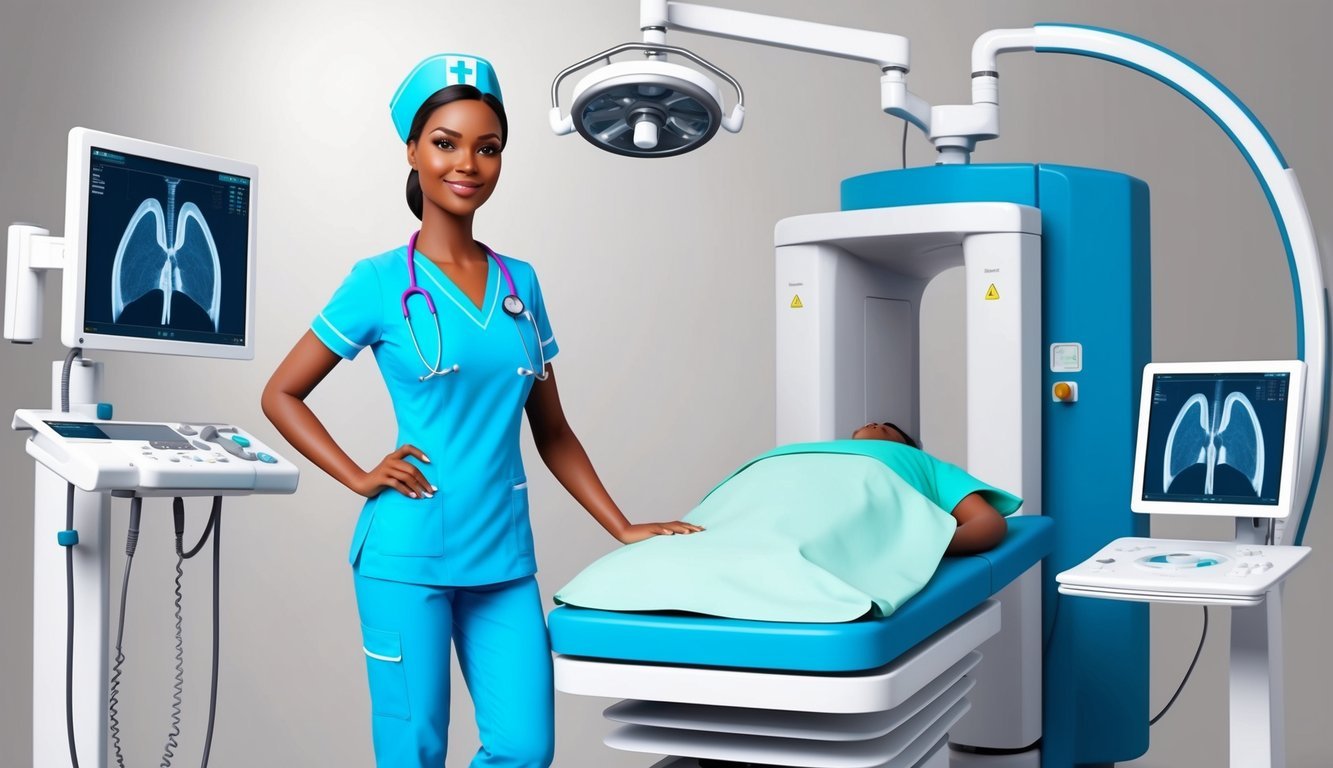As healthcare continues to evolve, the role of the interventional radiology nurse has gained prominence.
These professionals play a crucial part in delivering patient care by supporting minimally invasive procedures that utilize medical imaging technology.
This specialization not only enhances patient outcomes but also requires a unique blend of technical skills and compassionate care.
If you are considering a career as an interventional radiology nurse, you’re stepping into a field that is both dynamic and rewarding.
Your responsibilities will include assisting physicians during procedures, monitoring patients’ vital signs, and providing education on what to expect before and after their treatments.
This role offers the opportunity to work at the forefront of medical technology while making a significant impact on patients’ lives.
To become an interventional radiology nurse, you will need to embark on a specific educational path, typically starting with a nursing degree.
By understanding the necessary skills and qualifications, you can better prepare yourself for this fulfilling career in healthcare.
Explore this guide on how to become an interventional radiology nurse for detailed steps and insights.
The Role and Responsibilities
As an interventional radiology nurse, you play a critical role in ensuring patient safety and delivering high-quality care throughout the interventional process.
Key responsibilities include thorough patient assessments, effective use of imaging technologies, and comprehensive post-procedural care.
Patient Assessment and Care
In your role, conducting a detailed patient assessment is essential.
You evaluate vital signs, including blood pressure, heart rate, and oxygen saturation, to ensure they are within safe limits before procedures.
This helps identify any potential complications early on.
You also manage intravenous lines for medication administration, ensuring proper positioning and function.
It’s vital to educate the patient about the procedure, addressing any concerns they may have to promote informed consent.
This clear communication fosters trust and cooperation, essential for successful outcomes.
Operational Competence in Imaging Technology
Your expertise in imaging technologies is fundamental to the role.
You assist in utilizing equipment such as X-rays, MRI, and ultrasound during minimally invasive procedures.
Understanding the nuances of these technologies not only enhances procedural success but also minimizes radiation exposure to both patients and yourself.
Maintaining a safe environment through proper handling and calibration of imaging devices is part of your responsibilities.
Ensuring the readiness of all equipment and adhering to safety protocols decreases the risk of mishaps during procedures.
Post-Procedural and Post-Operative Care
After interventional procedures, your focus shifts to post-procedural care.
You monitor patients for any signs of complications, such as bleeding or infection at the access site.
Timely intervention is crucial for effective wound care and patient recovery.
Educating patients about what to expect during recovery, including activity restrictions and signs of complications, is also integral to your role.
You provide written instructions and ensure they understand their follow-up appointments, promoting adherence to care plans and enhancing recovery outcomes.
Becoming an Interventional Radiology Nurse
To become an interventional radiology nurse, you must meet specific educational and certification requirements.
This pathway includes obtaining necessary degrees, passing licensure examinations, and potentially pursuing advanced education.
Educational Requirements
The journey begins with earning a Bachelor of Science in Nursing (BSN).
This four-year degree program provides essential knowledge on nursing practices, patient care, and medical fundamentals.
Alternatively, you may opt for an Associate Degree in Nursing (ADN), which typically takes two to three years.
However, a BSN is often preferred due to its more comprehensive education.
Once you complete your degree, you will need to pass the National Council Licensure Examination (NCLEX-RN) to practice as a registered nurse.
This exam is crucial in ensuring your readiness for nursing responsibilities.
Licensure and Certification
After passing the NCLEX-RN, you can obtain your nursing license.
Each state has its requirements, so it’s important to check the specifics for your location.
In addition to basic licensing, pursuing the Certified Radiology Nurse (CRN) credential can enhance your qualifications.
To achieve CRN certification, you must demonstrate specialized knowledge and experience in radiology nursing.
This certification is offered by the Radiologic Nursing Certification Board (RNCB), emphasizing your expertise in the field.
Obtaining Advanced Cardiac Life Support (ACLS) certification is also beneficial.
This training prepares you to handle emergencies decisively, a vital skill in interventional radiology settings.
Advanced Education and Specialization
Further specialization may include earning a Master of Science in Nursing (MSN) or a Doctor of Nursing Practice (DNP) focused on advanced practice roles, such as a nurse practitioner or clinical nurse specialist in radiology.
Advanced education equips you with in-depth knowledge and clinical skills, allowing for greater responsibilities and the ability to perform advanced procedures within the interventional radiology unit.
Consider participating in workshops and continuing education opportunities to stay updated with the latest techniques and technology in radiology.
This ongoing learning is essential as it shapes your professional growth and enhances patient care quality.
Skills and Qualities for Success

To excel as an interventional radiology nurse, you need a combination of technical expertise and interpersonal skills.
These attributes are crucial for enhancing patient care and collaborating effectively with the medical team.
Technical Skills and Critical Thinking
Proficiency in technical skills is essential for any interventional radiology nurse.
This includes knowledge of medical imaging technologies and the ability to operate complex equipment.
Your attention to detail must be sharp, as even minor errors can have significant repercussions.
Critical thinking is equally important.
You will often face complex scenarios that require quick decision-making.
You should be able to evaluate patient conditions swiftly, prioritize interventions, and adapt strategies as necessary.
Training and experience in these areas will enhance your ability to function efficiently in a fast-paced environment.
Soft Skills: Empathy and Communication
Empathy is a vital quality in nursing, particularly in interventional radiology.
You will interact with patients who may be anxious or in pain.
Demonstrating understanding and compassion can help ease their concerns and foster trust.
Communication skills are essential for effective collaboration with physicians and other healthcare providers.
You need to clearly convey information about procedures and address any patient concerns.
Active listening and an approachable demeanor will also enhance patient relationships.
Strong communication helps in articulating findings and discrepancies during procedures, ensuring a smooth workflow in critical situations.
Incorporating these skills will significantly improve your effectiveness and the quality of care you provide.
Professional Growth and Career Outlook

As an interventional radiology nurse, you have avenues for professional growth through certification and continuing education, along with promising job outlook and advancement opportunities.
This commitment to improving your skills not only enhances patient care but also boosts your career trajectory.
Certification and Continuing Education
Certification is crucial for establishing your expertise.
One key certification is the Certified Radiology Nurse (CRN), which demonstrates advanced knowledge and skills in radiology nursing.
To achieve this, you must pass the CRN Exam, which enhances your credibility in the field.
Continuing education opportunities are abundant.
Many organizations offer workshops, online courses, and conferences.
Engaging in these can help you keep up with the latest technologies and best practices.
It’s essential to meet state requirements for continued nursing education, which is often a prerequisite for license renewal.
Job Outlook and Advancement Opportunities
The job outlook for interventional radiology nurses is positive, with projected growth rates around 9% from 2020 to 2030.
This demand is driven by the increasing reliance on minimally invasive procedures and advancements in imaging technologies.
Career advancement opportunities are plentiful.
With additional experience and certifications, you could move into specialized roles such as charge nurse or clinical educator.
These positions often come with increased responsibilities and higher salaries.
Networking within professional organizations can also pave the way for mentorship and leadership opportunities, enabling your growth in this specialized nursing field.
Work Environment and Salary

As an interventional radiology nurse, your work environment typically includes hospitals and outpatient clinics.
Understanding the compensation and benefits associated with this role is crucial as you navigate your career.
Hospitals and Outpatient Clinics
You will primarily work in hospitals or outpatient clinics that specialize in interventional radiology.
Hospitals often provide a fast-paced setting with complex cases involving imaging-guided procedures.
These procedures are vital in treating conditions such as cancer and vascular diseases.
In outpatient clinics, the focus may be on routine procedures and patient follow-up, offering a more controlled environment.
Collaborative work with a healthcare team, including radiologists and technologists, is essential in both settings, ensuring comprehensive care for patients.
Compensation and Benefits
An interventional radiology nurse’s salary can vary based on factors such as location and experience.
The average weekly pay is about $2,637 in the United States.
This translates to an annual income between $103,605 and $119,402, depending on facilities and regions.
In addition to salary, benefits often include health insurance, retirement plans, and paid time off.
Many facilities also offer opportunities for continuing education and professional development.
These can enhance your skills and potential for advancements within the field.

